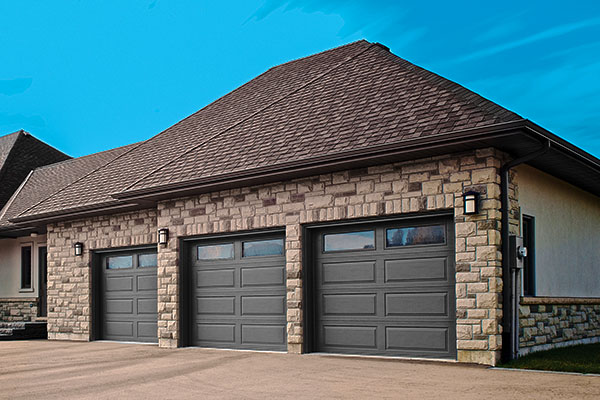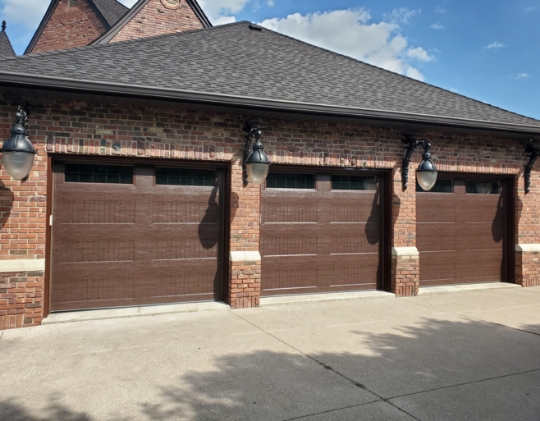
As a homeowner, your garage door significantly impacts both your home’s curb appeal and security. Doors are available in various materials, each offering unique features and benefits. Whether you’re shopping for a new door or replacing an existing one, it’s essential to understand the pros and cons of different materials.
The three most popular materials are steel, wood, and aluminum. Steel is the top choice, known for durability, followed by wood, valued for its classic look, and then aluminum, which is lightweight and resistant to corrosion. Each material has distinct characteristics, advantages, and drawbacks. In this article, we’ll provide an overview of each option, weighing the pros and cons to help you make an informed decision.
Advantages and Disadvantages of Steel, Wood, and Aluminum Garage Doors
Steel Garage Doors
Steel garage doors are the most popular option due to their durability and affordability. They are low-maintenance, energy-efficient, and available in a wide range of styles and colors. Steel garage doors can also withstand extreme weather conditions and are resistant to dents and scratches.
However, steel garage doors are susceptible to rust, which can damage the door’s appearance and weaken its structure. Steel doors can also dent easily, and repairs can be expensive. Additionally, steel doors are not as strong as other materials, such as wood or fiberglass.
Wood Garage Doors
Wood garage doors are an excellent choice for those looking for a traditional and stylish look. Wood doors are available in a wide range of styles and designs and are easy to customize. They are also durable and can last for many years with proper maintenance.
However, wood garage doors require more maintenance than other materials, and they are more susceptible to weather damage and warping. They are also more expensive than steel or aluminum doors and can be heavy, making them challenging to open manually.
Aluminum Garage Doors
Aluminum garage doors are a lightweight and affordable option that is resistant to rust and corrosion. They are low-maintenance, energy-efficient, and can be easily customized to fit your home’s style.
However, aluminum doors are not as strong as other materials, and they can be easily dented. They also have poor insulation properties, which can affect your home’s energy efficiency.
Weighing the Pros and Cons of Various Garage Door Materials
Choosing the right garage door material can be a challenging task, with several options available, each offering distinct advantages and drawbacks. Here, we’ll explore the most common materials used in door construction and weigh their pros and cons.
Steel Doors:
Steel is a popular choice for its durability and affordability. Steel doors come in a range of styles, from traditional raised panel to modern flush and carriage house designs. They also vary in thickness, with thicker models offering better insulation and noise reduction.
One advantage of steel doors is their low maintenance. Unlike wood, steel resists rot, warping, and cracking. However, steel can be prone to dents and scratches, which may be hard to repair. Additionally, steel doors are relatively heavy, which can pose challenges for certain openers.

Wooden Garage Doors:
Wooden garage doors offer a classic, elegant look that can add curb appeal to any home. They are available in a variety of styles, including traditional carriage house designs, and can be customized with different finishes and stains.
One advantage of wooden garage doors is their natural insulation properties. They provide excellent heat retention, making them a good choice for colder climates. However, wooden doors require regular maintenance to prevent rot, warping, and cracking. They are also susceptible to insect damage, which can be a concern in some areas.
Aluminum Garage Doors:
Aluminum garage doors are a lightweight, low-maintenance option that is resistant to rust and corrosion. They are available in a variety of styles and colors, and can be customized to match the look of your home.
One advantage of aluminum garage doors is their low weight, which can be an advantage for older or smaller garage door openers. They are also resistant to rust and corrosion, which can be a concern in humid or coastal areas. However, aluminum doors are not as durable as steel or wood, and can dent or scratch easily.
Exploring the Strengths and Weaknesses of Garage Door Materials
When selecting a garage door material, it’s essential to weigh the pros and cons of each option. Steel doors are durable and budget-friendly but can be heavy and prone to dents. Wooden doors provide natural insulation and a timeless appearance, though they require regular maintenance to avoid rot and insect damage. Aluminum doors are lightweight and low-maintenance, but they may lack the durability of other materials.
Beyond the material, consider additional factors like insulation level, opener compatibility, and the overall design and style. By evaluating all these aspects, you can choose a door that meets your needs and fits within your budget.
Deciding Between Steel, Wood, and Aluminum: The Pros and Cons
When deciding between steel, wood, and aluminum garage doors, it’s important to consider your budget, style preferences, and maintenance requirements. Each material has its own set of pros and cons, and the right choice for you will depend on your individual needs. In this section, we will explore the pros and cons of each material to help you make an informed decision.
Steel garage doors are the most popular choice for homeowners due to their durability and low maintenance. They are also the most cost-effective option, making them an excellent choice for those on a budget. Steel doors come in a variety of styles and designs, and they can be painted to match your home’s exterior. However, steel doors are susceptible to dents and scratches, which can be difficult to repair. They also don’t provide as much insulation as wood or aluminum doors.
Wood garage doors are a timeless classic and can add warmth and character to any home. They are available in a range of styles and finishes and can be customized to suit your preferences. Wood doors offer excellent insulation, making them a great choice for those living in colder climates. However, they require more maintenance than steel or aluminum doors and are susceptible to rot and insect damage. They are also the most expensive option, making them a less attractive choice for those on a budget.
Aluminum garage doors are lightweight and low-maintenance, making them an excellent choice for those looking for a modern, contemporary look. They are available in a range of finishes and can be painted to match your home’s exterior. Aluminum doors are also resistant to rust and corrosion, making them a great choice for those living in coastal areas. However, they are less durable than steel or wood doors and can dent easily.
Conclusion
Ultimately, the choice of garage door material depends on your preferences and budget. By weighing the pros and cons of each material—whether steel, wood, or aluminum—and considering factors like insulation, durability, and design, you can select a door that meets your needs and enhances your home’s curb appeal. Key considerations include durability, cost, appearance, and maintenance requirements. Each material has its own benefits, so it’s essential to choose the one that best aligns with your priorities, whether that’s strength, aesthetics, or affordability.
At Gold Garage Door, we offer high-quality installation services for all types of materials. Our team of experts can guide you in selecting the ideal material for your needs and provide professional installation to ensure long-lasting performance. Contact us today to learn more about our services in Burbank, CA.
FAQs about Garage Door Materials
Garage doors come in a variety of materials and styles, and choosing the right one for your home can be a daunting task. In this FAQ section, we’ll provide you with some basic information to help you make an informed decision when choosing a garage door material.
What is the most durable garage door?
When it comes to durability, steel garage doors are the most popular choice. They’re strong, low-maintenance, and resistant to damage from the elements. Some steel garage doors are even designed to withstand hurricane-force winds. However, steel can dent and scratch easily, so it’s important to choose a high-quality steel garage door that’s designed to resist these types of damages.
What material makes most garage doors?
Steel is the most common material used to make garage doors. It’s affordable, durable, and low-maintenance. Other popular materials include wood, aluminum, and vinyl.
Which garage door is extremely durable and the most economical?
Steel garage doors are the most economical option when it comes to durability. They’re long-lasting, low-maintenance, and resistant to damage from the elements. They’re also available in a variety of styles, so you can choose a design that complements your home’s exterior.
What are the three types of garage doors?
The three most common types of garage doors are:
- Sectional garage doors: These doors are made up of panels that slide up and over the opening, allowing you to park your car close to the door without it interfering with the opening.
- Roller garage doors: These doors roll up into a coil above the opening, which saves space in the garage.
- Side-hinged garage doors: These doors swing open like traditional doors, and are a good option if you have limited headroom in your garage.
In summary, garage door material selection is an important decision that requires careful consideration. Steel, wood, and aluminum are the most common materials used in garage doors, each with their own advantages and disadvantages. Steel doors are durable and low-maintenance, while wood doors are aesthetically pleasing but require more maintenance. Aluminum doors are lightweight and corrosion-resistant, but are not as durable as steel or wood.
Overall, it’s important to do your research and consider your individual needs and preferences when choosing a garage door material. With the right information and a reliable installation service, you can ensure a long-lasting and functional garage door for your home or business.
